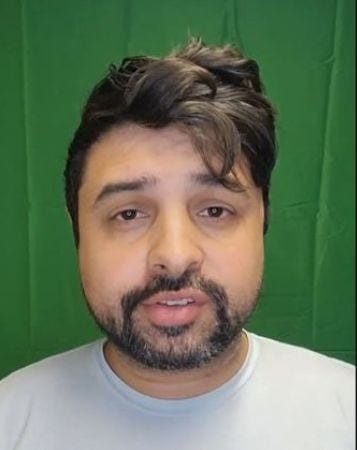By Richard Luthmann
Cancel culture isn’t just ruining reputations—it’s ending lives. That’s the hard truth Richard Luthmann delivered on Maryann Petri’s Slam the Gavel podcast, where he dissected the twisted tactics of TikTok influencer Danesh Noshirvan.
Noshirvan, known to his 2 million followers as @ThatDaneshGuy, is under scrutiny for his role in the tragic death of Texas high school football coach Aaron De La Torre.
“This guy didn’t just ruin a man’s life—he drove him to his death,” Luthmann stated bluntly on the podcast.
De La Torre, a decorated coach at Denton Ryan High School, took his own life after Noshirvan’s online smear campaign falsely accused him of assaulting a minor. Although the local police cleared De La Torre of any wrongdoing, the relentless online harassment took a toll.
“He was scared to death of being labeled a predator,” Luthmann explained. “In today’s world, that label sticks, even when it’s a lie.”
Luthmann detailed how Noshirvan uses artificial intelligence, sock puppet accounts, and outright fraud to simulate outrage.
“He creates fake accounts—sock puppets—to make it look like thousands of people are calling for blood,” Luthmann said.
Frank Parlato Walks Among Digital Cancel Culture's Dystopian Tombstones
The Rise of Accountability Culture
These fake accounts flood employers, law enforcement, and social media platforms with false reports, overwhelming systems meant to protect, not persecute.
“It’s not activism,” Luthmann added. “It’s weaponized dishonesty.”
The podcast revealed that Texas authorities are building a case to indict Noshirvan for criminally negligent homicide. Detective Jason Richbourg leads the investigation, which includes forensic subpoenas to TikTok and other platforms.
“The evidence is there,” Luthmann insisted. “IP logs, chat records, metadata—it all traces back to Noshirvan’s network.”
Prosecutors believe they can prove that Noshirvan’s reckless campaigns meet the legal standard for gross negligence leading to death.
Petri, known for exposing injustices in family courts, drew parallels between De La Torre’s case and the systemic abuse she’s uncovered.
“This is the same trauma we see in family court—PTSD, anxiety, and in some cases, suicide,” she said.
Luthmann agreed, likening the psychological impact of Noshirvan’s campaigns to the effects of violent crime.
“Brain scans of cancel culture victims show the same PTSD patterns as war veterans and rape survivors,” he said. “This isn’t just online bullying—it’s psychological warfare.”
But Noshirvan’s antics don’t stop at small-town coaches. Luthmann exposed how Noshirvan targeted U.S. Supreme Court Justices after the Roe v. Wade decision in 2022.
“He didn’t just voice his disagreement—he doxxed them,” Luthmann revealed.
Noshirvan allegedly shared the home addresses, places of worship, and even the schools of the justices’ children.
“Justice Kavanaugh and his family were almost murdered because of this,” Luthmann said, citing an incident where a disturbed individual armed with weapons and burglary tools was apprehended near Kavanaugh’s home.
Despite these alarming actions, Noshirvan has evaded prosecution—until now. Luthmann believes that the De La Torre case could mark the end of Noshirvan’s reign.
“I think this might be the end of cancel culture as we know it,” Luthmann declared. “We don’t need this kind of destructive force in our society.”
As the grand jury prepares to hear the case, Noshirvan’s recent behavior suggests he knows the walls are closing in.
“He’s deleting content, changing social media settings, trying to cover his tracks,” Luthmann noted.
However, according to sources, investigators already have the necessary data, thanks to forensic subpoenas that uncovered detailed logs of Noshirvan’s digital activities.
The podcast ended with a call for accountability for Noshirvan and the broader culture of online harassment.
“Social media influencers want to be judge, jury, and executioner,” Luthmann warned.
“But when their actions lead to real-world harm, it’s time to hold them accountable.”
Justice can't come soon enough for Aaron De La Torre’s family.
“He was a great man who dedicated his life to helping kids,” a former colleague said. “He didn’t deserve this.”
As Texas prepares to make its case against Danesh Noshirvan, one thing is clear: cancel culture isn’t just a social media trend—it’s a crime waiting to be prosecuted.


















Share this post